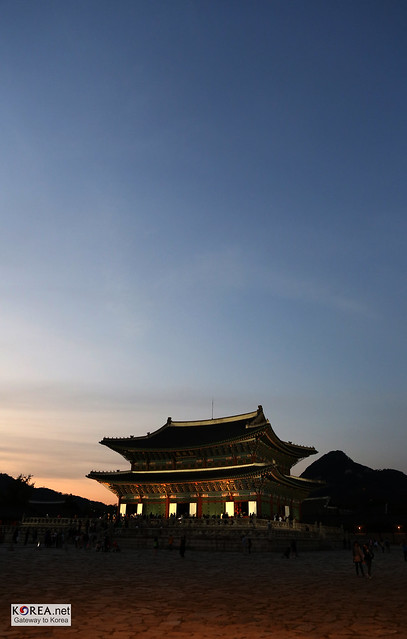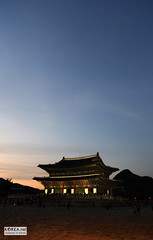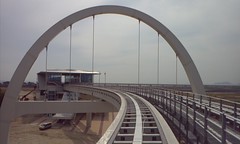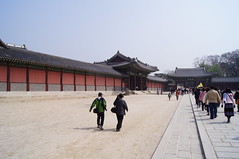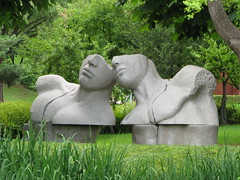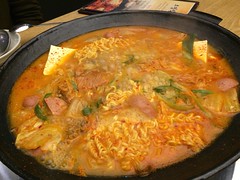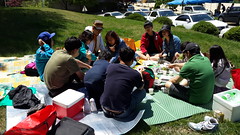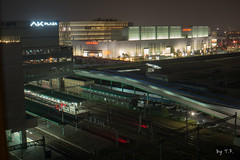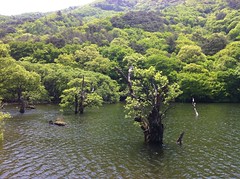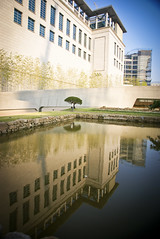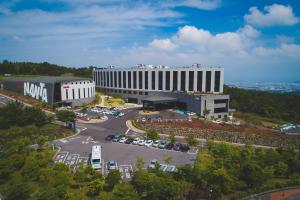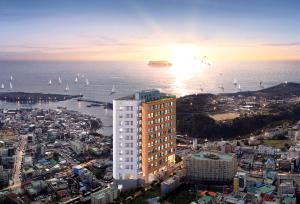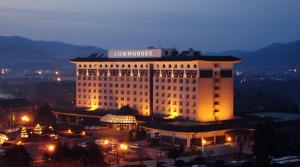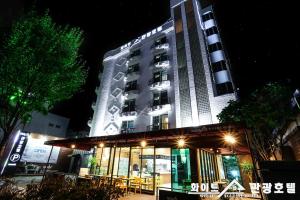 South Korea
South Korea
South Korea, officially the Republic of Korea (ROK), is a country in East Asia. It constitutes the southern part of the Korean Peninsula and borders North Korea. The country's western border is formed by the Yellow Sea, while its eastern border is defined by the Sea of Japan. South Korea claims to be the sole legitimate government of the entire peninsula and adjacent islands. It has a population of 51.75 million, of which roughly half live in the Seoul Capital Area, the fourth most populous metropolitan area in the world. Other major cities include Incheon, Busan, and Daegu.
The Korean Peninsula was inhabited as early as the Lower Paleolithic period. Its first kingdom was noted in Chinese records in the early 7th century BCE. Following the unification of the Three Kingdoms of Korea into Silla and Balhae in the late 7th century, Korea was ruled by the Goryeo dynasty (918–1392) and the Joseon dynasty (1392–1897). The succeeding Korean Empire (1897–1910) was annexed in 1910 into the Empire of Japan. Japanese rule ended following Japan's surrender in World War II, after which Korea was divided into two zones; a northern zone occupied by the Soviet Union and a southern zone occupied by the United States. After negotiations on reunification failed, the southern zone became the Republic of Korea in August 1948 while the northern zone became the communist Democratic People's Republic of Korea the following month.
In 1950, a North Korean invasion began the Korean War, which saw extensive American-led United Nations intervention in support of the South, while China intervened to support the North, with Soviet assistance. After the war's end in 1953, the country entered into a military alliance with the U.S., which continues to this date, and its devastated economy began to soar, recording the fastest rise in average GDP per capita in the world between 1980 and 1990. Despite lacking natural resources, the nation rapidly developed to become one of the Four Asian Tigers based on international trade and economic globalization, integrating itself within the world economy with export-oriented industrialization; currently being one of the largest exporting nations in the world, along with having one of the largest foreign-exchange reserves in the world. The June Democratic Struggle led to the end of authoritarian rule in 1987 and the country is now considered among the most advanced democracies in Asia, with the highest level of press freedom on the continent.
South Korea is a regional power and a developed country, with its economy being ranked as the world's thirteenth-largest by nominal GDP and the fourteenth-largest by GDP (PPP). It ranks nineteenth globally by Human Development Index. In recent years, the country has been facing an aging population and the lowest fertility rate in the world. South Korea's citizens enjoy one of the world's fastest Internet connection speeds and the densest high-speed railway network. The country is the world's ninth-largest exporter and ninth-largest importer. Its armed forces are ranked as one of the world's strongest militaries, with the world's second-largest standing army by military and paramilitary personnel. In 21st century, South Korea has been renowned for its globally influential pop culture, particularly in music (K-pop), TV dramas (K-dramas) and cinema, a phenomenon referred to as the Korean Wave. It is a member of the OECD's Development Assistance Committee, the G20, the IPEF, and the Paris Club.
Etymology
The name Korea derives from the name Goryeo. The name Goryeo itself was first used by the ancient kingdom of Goguryeo, which was considered a great power of East Asia during its time, in the 5th century as a shortened form of its name. The 10th-century kingdom of Goryeo succeeded Goguryeo, and thus inherited its name, which was pronounced by the visiting Arab and Persian merchants as "Korea". The modern name of Korea appears in the first Portuguese maps of 1568 by João vaz Dourado as Conrai and later in the late 16th century and early 17th century as Korea (Corea) in the maps of Teixeira Albernaz of 1630.
The kingdom of Goryeo became first known to Westerners when Afonso de Albuquerque conquered Malacca in 1511 and described the peoples who traded with this part of the world known by the Portuguese as the Gores. Despite the coexistence of the spellings Corea and Korea in 19th century publications, some Koreans believe that Imperial Japan, around the time of the Japanese occupation, intentionally standardized the spelling on Korea, making Japan appear first alphabetically.
After Goryeo was replaced by Joseon in 1392, Joseon became the official name for the entire territory, though it was not universally accepted. The new official name has its origin in the ancient kingdom of Gojoseon (2333 BCE). In 1897, the Joseon dynasty changed the official name of the country from Joseon to Daehan Jeguk (Korean Empire). The name Daehan (Great Han) derives from Samhan (Three Han), referring to the Three Kingdoms of Korea, not the ancient confederacies in the southern Korean Peninsula. However, the name Joseon was still widely used by Koreans to refer to their country, though it was no longer the official name. Under Japanese rule, the two names Han and Joseon coexisted. There were several groups who fought for independence, the most notable being the Provisional Government of the Republic of Korea (/).
Following the surrender of Japan, in 1945, the "Republic of Korea" (/ , IPA: ˈtɛ̝ːɦa̠nminɡuk̚, ; listen) was adopted as the legal English name for the new country. However, it is not a direct translation of the Korean name. As a result, the Korean name "Daehan Minguk" is sometimes used by South Koreans as a metonym to refer to the Korean ethnicity (or "race") as a whole, rather than just the South Korean state. Conversely, the official name of North Korea in English, the "Democratic People's Republic of Korea", is a direct translation of the Korean name.
Since the government only controlled the southern part of the Korean Peninsula, the informal term "South Korea" was coined, becoming increasingly common in the Western world. While South Koreans use Han (or Hanguk) to refer to both Koreas collectively, North Koreans and ethnic Koreans living in China and Japan use the term Joseon instead.
History
Ancient Korea
The Korean Peninsula was inhabited as early as the Lower Paleolithic period. The history of Korea begins with the founding of Joseon (also known as "Gojoseon", or Old Joseon, to differentiate it with the 14th century dynasty) in 2333 BCE by Dangun, according to Korea's foundation mythology."An extreme manifestation of nationalism and the family cult was the revival of interest in Tangun, the mythical founder of the first Korean state... Most textbooks and professional historians, however, treat him as a myth."
"Although Kija may have truly existed as a historical figure, Tangun is more problematical."
"Most historians treat the tangun myth as a later creation."
"The Tangun myth became more popular with groups that wanted Korea to be independent; the Kija myth was more useful to those who wanted to show that Korea had a strong affinity to China."
"If a choice is to be made between them, one is faced with the fact that the Tangun, with his supernatural origin, is more clearly a mythological figure than Kija."
Gojoseon was noted in Chinese records in the early 7th century. Gojoseon expanded until it controlled the northern Korean Peninsula and parts of Manchuria. Gija Joseon was purportedly founded in the 12th century BCE, but its existence and role have been controversial in the modern era. In 108 BCE, the Han dynasty defeated Wiman Joseon and installed four commanderies in the northern Korean peninsula. Three of the commanderies fell or retreated westward within a few decades. As Lelang commandery was destroyed and rebuilt around this time, the place gradually moved toward Liaodong. Thus, its force was diminished and it only served as a trade center until it was conquered by Goguryeo in 313.
Three Kingdoms of Korea
During the period known as the Proto–Three Kingdoms of Korea, the states of Buyeo, Okjeo, Dongye and Samhan occupied the whole Korean peninsula and southern Manchuria. From them, Goguryeo, Baekje and Silla emerged to control the peninsula as the Three Kingdoms of Korea. Goguryeo, the largest and most powerful among them, was a highly militaristic state, and competed with various Chinese dynasties during its 700 years of history. Goguryeo experienced a golden age under Gwanggaeto the Great and his son Jangsu, who both subdued Baekje and Silla during their times, achieving a brief unification of the Three Kingdoms of Korea and becoming the most dominant power on the Korean Peninsula. In addition to contesting for control of the Korean Peninsula, Goguryeo had many military conflicts with various Chinese dynasties, most notably the Goguryeo–Sui War, in which Goguryeo defeated a huge force said to number over a million men. Baekje was a great maritime power; its nautical skill, which made it the Phoenicia of East Asia, was instrumental in the dissemination of Buddhism throughout East Asia and continental culture to Japan. Baekje was once a great military power on the Korean Peninsula, especially during the time of Geunchogo, but was critically defeated by Gwanggaeto the Great and declined. Silla was the smallest and weakest of the three, but it used cunning diplomatic means to make opportunistic pacts and alliances with the more powerful Korean kingdoms, and eventually Tang China, to its great advantage.
The unification of the Three Kingdoms by Silla in 676 led to the North South States Period, in which much of the Korean Peninsula was controlled by Later Silla, while Balhae controlled the northern parts of Goguryeo. Balhae was founded by a Goguryeo general and formed as a successor state to Goguryeo. During its height, Balhae controlled most of Manchuria and parts of the Russian…
Hotels South Korea
Looking for places related to South Korea?
Those are other destinations to find places related to South Korea:
